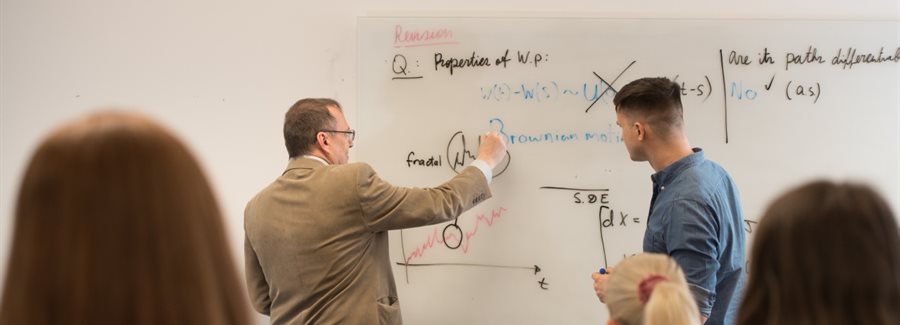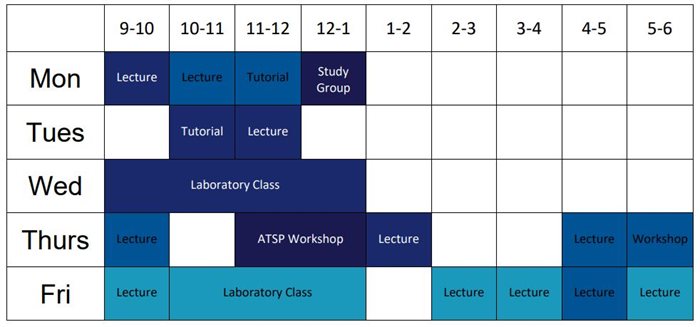Teaching and Learning

Studying at university is different to your previous learning, classes are often larger and you are taught by academics who are working at the cutting edge of their field.
Teaching is provided via a modular structure. Modules are measured in credits, and notionally each credit takes ten hours of study time. Students take 120 credits worth of modules a year.
Each year is divided into two 15 week semesters (Autumn and Spring), and modules will run in either one of those semesters or span a full year. Students take a mixture of compulsory modules, which are essential to the understanding of the subject, and optional modules, which enable students to further tailor their degree to their interests.
There are compulsory Natural Sciences modules in the first and third year but the majority of modules are dictated by the subjects you have chosen to study as part of Natural Sciences. The subject-based modules taken by Natural Sciences students are often taught jointly with other programmes so you study biology alongside other biological degrees and mathematics alongside other mathematical degrees.
Types of Classes
Because you'll be studying three different subjects you will experience many teaching styles and types of class:
- Lectures - vary widely in size from small 30 student classes up to groups of up to 400 students.
- Tutorials - groups of 5-6, where lecture material or problems are discussed in greater detail.
- Problem Classes/Workshops - support lecture-based learning by exploring problems, computing, or practical approaches usually 30-40 students.
- Seminars - sessions for discussion and debate of ideas, in a class size typically ranging from 5-25
- Laboratory Classes/Field Classes - classes in which you'll be conducting practical work and putting theory into practice. Over the course of your degree practical work will become more self-led. Labs usually have no more than 50 students at any given time and field classes are usually slightly smaller than this with a max of 30-40 students.
Assessment
All your assessments, whether coursework or exams, are set directly by the lecturers who are teaching you. Some modules are assessed entirely by exam, others entirely by coursework, and some by both exam and coursework.
- Examinations - in specific exam periods, may be in-person or online, range from 1-3 hours in length, can be multiple choice, short answer, technical or essay questions.
- Coursework - completed during the semester, Includes:
- Reports
- Essays
- Presentations
- Problem Sheets
- You may have multiple pieces of coursework for a module including regular weekly deadlines with work that is continually assessed.
Facilities for learning
The University has enviable facilities for teaching and learning including modern lecture theatres which hold anywhere from 30 to 500 students at a time to smaller rooms to facilitate problem classes, discussion classes and workshops.
Since the modules you study are taught by the individual contributing subjects Natural Sciences students benefit from specialised teaching facilities in each of the subjects that you study including fully equipped teaching laboratories and dedicated networked computer labs providing access to any software required for your studies.
Independent learning is supported through our excellent learning facilities with space for individual and group study, a wide selection of electronic and physical resources through our libraries and access to PCs and printers across our campuses.
What does a typical week look like?
The following timetable is based on the first-year timetable for the Biology, Chemistry, Maths stream. Tutorials are not always part of your core teaching timetable but arranged separately with your tutor at a mutually convenient time.
The number of contact hours in a typical week ranges from 18 to 23 depending on the stream. Subjects with less contact time involve more self-led study, so fewer hours of contact time does not mean there will be less work to do.
